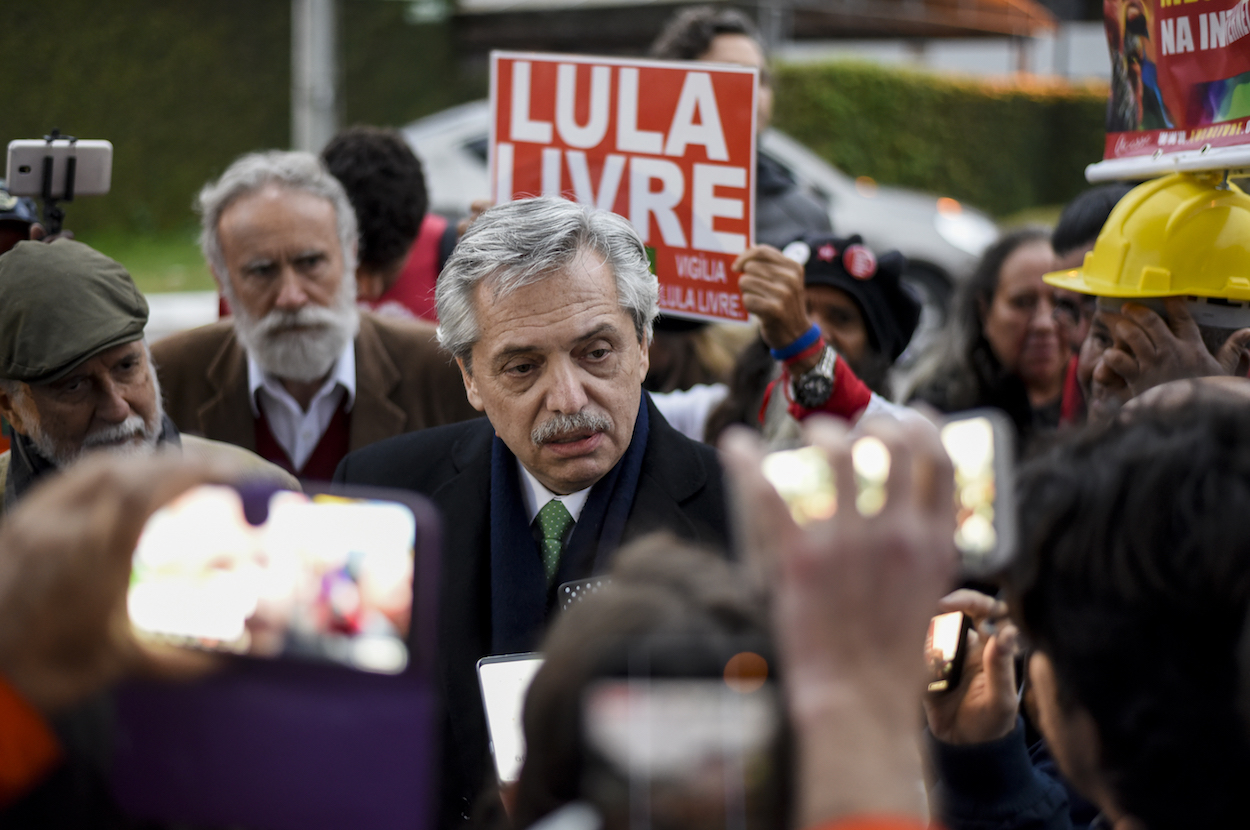Just hours before election results showed him winning Argentina’s presidential election on October 27, Alberto Fernández took to Twitter to wish a happy birthday to Brazil’s former President Inácio Lula da Silva. In the photo, Fernández made the “Free Lula” sign, a highly provocative gesture seemed directed at Brazil’s President Jair Bolsonaro. In his victory speech that night, Fernández again called for Lula to go free. Both moves foreshadow what is likely to be a complicated relationship between Fernández and Bolsonaro.
After initially calling Bolsonaro “racist, misogynist and violent,” Fernández had in recent weeks resisted the temptation of responding to a series of provocations from Bolsonaro. Even as it became increasingly clear that Fernández would succeed Mauricio Macri as president of Argentina, Bolsonaro doubled down on his criticism of Argentina’s left. The latest happened during his tour of Asia, when Bolsonaro threatened to “exclude” Argentina from the Mercosur trade block should Fernández not agree to go along with rapid trade liberalization. That isn’t a real threat since member countries cannot be excluded from the group unless they violate democratic norms, but Bolsonaro’s rhetoric has been consistent since Fernández defeated Macri handily in August’s primary elections.
“We run the risk (…) of an invasion by Argentine [economic migrants]” Bolsonaro told local journalists at the time; Fernández and former President Cristina Fernández de Kirchner were “leftist bandits,” he warned.
The odds are thus that Bolsonaro and Fernández will struggle to develop a pragmatic working relationship over the coming years, despite the fact that both countries depend on each other. After all, Brazil is Argentina’s most important trading partner and a recent study suggests the crisis in Argentina will shave off 0.5% of Brazil’s GDP this year. The troubled relationship may produce wide-ranging consequences, not only for South America’s two largest economies, but also for regional politics as a whole.
The challenges
Three tangible policy differences between Brazil and the next government in Buenos Aires represent the greatest threat to bilateral ties in decades.
First and most importantly, Bolsonaro and Fernández are likely to disagree about the future of Mercosur. While Brazil seeks to press ahead with trade liberalization – including a controversial idea to unilaterally reduce tariffs – Argentina is likely to prefer a more cautious, gradual approach. Under President Kirchner (2007-2015), who is also the country’s next vice president, Argentina had adopted a protectionist strategy. Alberto Fernández, though more pragmatic than Kirchner, will still most likely seek to renegotiate parts of Mercosur’s trade deal with the EU, which would delay ratification. Even if the two find common ground vis-à-vis the EU deal, Argentina is unlikely to embrace Brazil’s plan to sign a series of additional deals in the coming years. That would leave the club’s two other members, Paraguay and Uruguay, in an uncomfortable situation, forcing them to adopt a wait-and-see approach.
While the outright end of Mercosur remains somewhat unlikely given resistance from Brazilian industry and other interest groups, a downgrade from customs union to free trade area (i.e., without a common external tariff) is a possible result of the divergence between Bolsonaro and Fernández.
On the two main issues that shape Latin American affairs today — the crisis in Venezuela and the rise of China — Brazil and Argentina will diverge, making cooperation more difficult. Under Fernández, Buenos Aires will almost certainly abandon the Lima Group, made up of mostly Latin American nations, including Brazil, that do not recognize Nicolás Maduro as president of Venezuela. Rather, Argentina will likely join Uruguay, Mexico and Bolivia, which refrained from recognizing Juan Guaidó as legitimate president. With Fernández in charge, Argentina is also likely to deepen economic and political ties with China even further, and U.S. diplomats privately concede that the peronist is unlikely to be of much help to the United States’ efforts to limit Chinese influence across Latin America. That, in turn, is likely to lead Trump to increase pressure on President Bolsonaro to take a clearer stance against Beijing, for example by following the U.S. lead and banning Huawei from building Brazil’s 5G network. During his recent trip to Beijing, Bolsonaro said he was in a “capitalist country” and vaguely suggested the Chinese telecommunications firm would be allowed to join the bidding, but the final decision will only be made in late 2020.
Unless Brasília and Buenos Aires cooperate effectively, there is little hope for better regional cooperation in areas ranging from fighting transnational crime, addressing the Venezuelan migration crisis or discussing how the continent should react to the trade war between Washington and Beijing.
Given this triple challenge — trade, Venezuela and U.S.-China tensions — the key challenge for policy makers, the private sector and civil society in both Argentina and Brazil will be to mitigate the trouble ahead and preserve the tremendous progress made since the 1980s, when secret diplomatic negotiations and trust-building measures led to an agreement to overcome a complex nuclear rivalry, a historic achievement that set the stage for close cooperation on many levels today.








